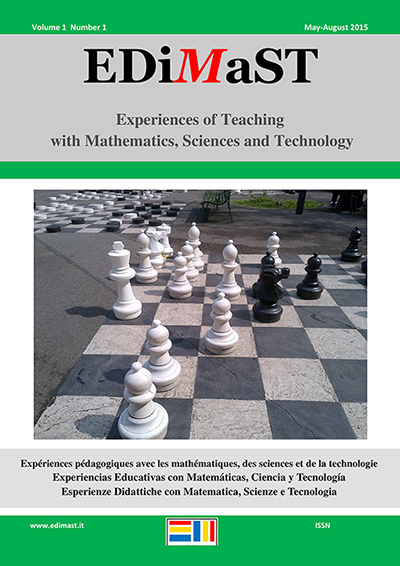Educazione tecnologica nella scuola secondaria di primo grado italiana: una disciplina da valorizzare?
Keywords:
Educazione Tecnologica, Scuola Secondaria di primo grado, CurriculumAbstract
In this article we propose a reflection on disciplinary matters on the subject called "Technology" of the curriculum of lower secondary school called "Technology" in the first degree of secondary school (for students from 9 to 14 years old). This reflection is based on the need for understanding the potential of this curriculum subject in the development of students as for their discovery of the world, and in view of their future educational and career choices.References
Andreucci, Chatoney, Ginestie, (2012). The systemic approach to technological education: effects of transferred knowledge in the solving of physics. International Journal of Technology and Design Education, 22(3), 281296.
Ankiewicz P., (2015). The implications of the philosophyof technology for the academic majors of technology student teachers. PATT Conference, 7-10 April, Marseille.
Ankiewicz PJ., De Swardt A.E., De Vries M., (2006). Some implications of the philosophy of technology for science, technology and society (STS) studies. International Journal of Technology and Design Education 16, 117–141.
Ardies, De Maeyer, van Keulen, (2015). Students attitudes towards technology. Int J Technol Des Educ, 25, 43– 65.
Bonnardel N., (2009). Activités de conception et créativité : de l’analyse des facteurs cognitifs à l’assistance aux activités de conception créatives. Le travail humain, 1(72), 5-22.
Ciampolini A., Serra G., (2007). Un possibile schema per l’insegnamento della Cultura Tecnologica nella scuola. In (Ed) Maria Famiglietti. Tecnologia. Ricerca sul curriculo e innovazione didattica. Collana “Quaderni dei Gruppi di ricerca USR e IRRE Emilia-Romagna”, Quaderno, 5.
De Vries M.J., (2012). In M.J. de Vries & I. Mottier (Eds.), International handbook of technology education: Reviewing the past twenty years (pp. 387–397). Rotterdam/Taipei: Sense Publishers.
De Vries M.J., (2003). The nature of technological knowledge: extending empirically informed studies into what engineers know. Techné, 6(3), 1–21.
Esjeholm B., (2015). Design knowledge interplayed with student creativity in D&T projects. Int J Technol Des Educ, 25, 227–243.
Engestrom S., (2013). The Different Faces of Staging a Technology Lessen and a Science Lessoon. In (Ed) P. John Williams. Technology Education for the Future: A play on Sustainability. Proceeding Patt 27 Conference, pp. 160-165. University of Waikato, Christchurch, NZ.
Famiglietti M., (2007). Tecnologia. Ricerca sul curriculo e innovazione didattica. Collana “Quaderni dei Gruppi di ricerca USR e IRRE Emilia-Romagna”, Quaderno, 5.
Feinstein N., (2010). Salvaging Science Literacy. Science Education, 95(1).
Fourez G., (1994). Alphabe´tisation scientifique et technique: essai sur les finalite´s de l’enseignement des sciences. Bruxelles: De Boeck-Wesmael.
Gumaelius L., Skogh I., (2015). Work plans in technology. A study of technology education practice in Sweden. In Proceeding PATT 2015, 7-12 April, Marseille.
Impedovo M.A., Andreucci C., Delserieys-Pedregosa A., Ginestié J., Coiffard C., (2015). Technical objects between Categorisation and Learning: An exploratory case study in French middle school. Design and Technology Education: An International Journal, (ISSN 1360-1431), 20 (2), 32- 49.
Johansson L., (2009). Mathematics, science & technology education report. European Round Table of Industrials, Brussel.
Jones A., Buntting C., De Vries M., (2013). The developing field of technology education: a review to look forward. Int J Technol Des Educ, 23, 191–212.
Limoncello A., (2004). Dall’Educazione Tecnica alla Tecnologia. Convengno nazionale CGIL scuola proteo fare sapere “Scuola Media, la “terra di mezzo”, un dialogo aperto con elementari e medie”, Paestum, 27 – 28 Aprile.
Mawson B., (2007). Factors affecting learning in technology in the early years at school. International Journal of Technology and Design Education, 17(3), 253-269.
Rauscher W., (2011). The technological knowledge used by technology education students in capability tasks”. International Journal of Technology and Design Education, 21(3), 291-305.
Ritz J., Martin G., (2013). Research needs for technology education: an international perspective. Int J Technol Des Educ, 23, 767–783.
Rychen D.S., Salganik L.H., (2003). A holistic model of competence. In D. S. Rychen and L. H. Salganik (Eds.), Key competencies for a successful life and a well functioning society. (pp. 41-62). Cambridge, MA: Hogrefe & Huber Publisher.
Sacchi G.C., (2012). Tecnologia e nuove Indicazioni. http://scienzedellatecnica.blogspot.it/. (verificato in data 24/07/2015).
Schreiner C., Sjoberg S., (2004). ROSE (The Relevance of Science Education). Oslo: University of Oslo.
Shamos M.H., (1995). The Myth of Scientific Literacy. New Brunswick, US: Rutgers University Press.
Tafuri G., (1994). http://www.disced.unisa.it/Quaderni/Qua_Vol_04-1994/Q_V04_231-238.html. (verificato in data 24/07/2015).
Van Niekerk E., Ankiewicz P., De Swardt E., (2010). A process-based assessment framework for technology education: a case study. International Journal of Technology and Design Education, 20(2), 191-215.





